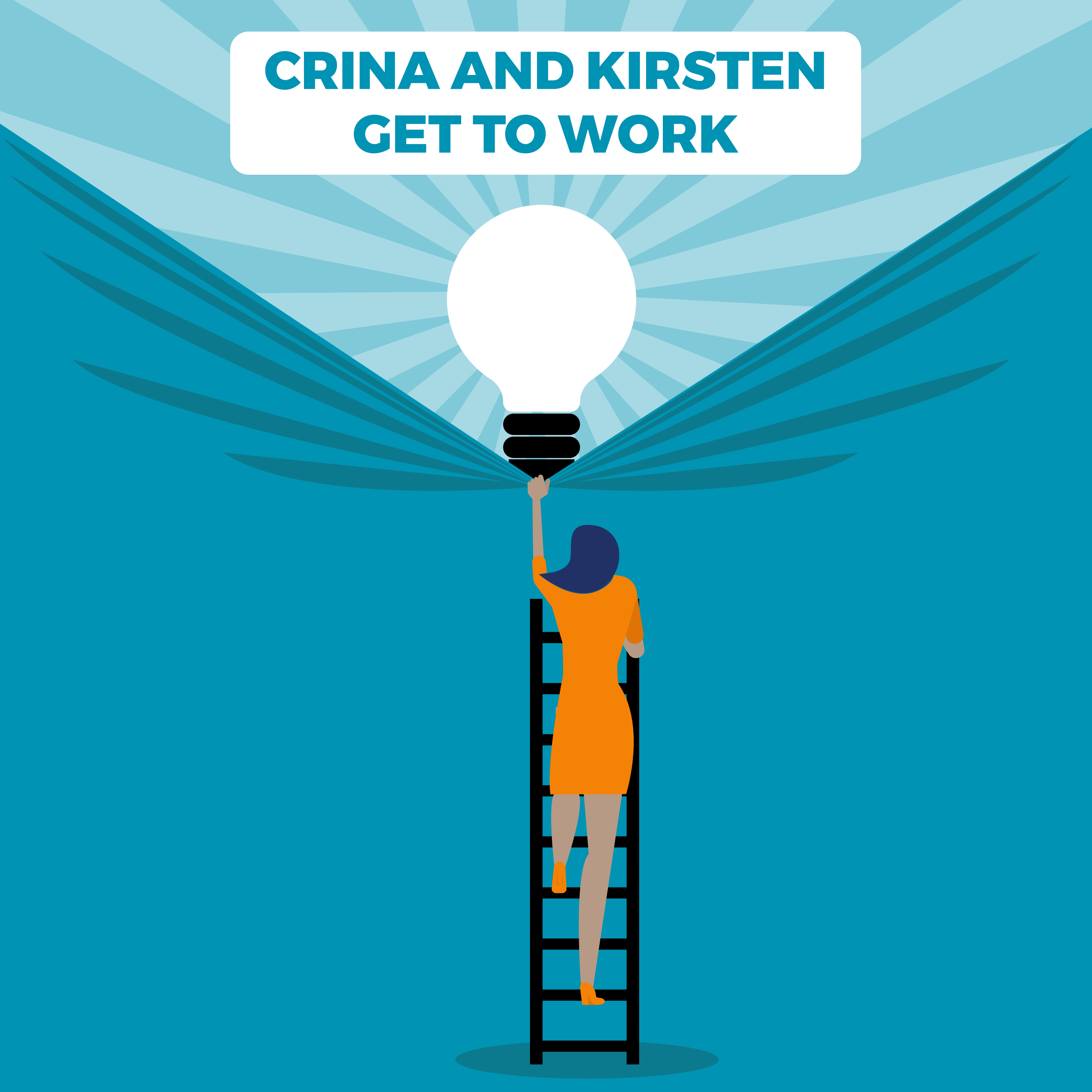Crina and Kirsten Get to Work

We have one single mission: Help women find ease, meaning and joy at work and in life. We use our experiences as business owners, entrepreneurs, mentors and inspirational leaders to explore topics that all working women care about: shitty bosses; smashing the patriarchy; balancing work and life; navigating change and getting what you want! We guarantee that you will be entertained and inspired... promise!
Episodes
Episodes



Friday Jan 19, 2024
Friday Jan 19, 2024
On this episode of Crina and Kirsten Get to Work, our hosts delve into the topic of “happierness” and explore the secrets to building a fulfilling life in 2024. How is that for ease, meaning and joy in 2024!! Drawing insights from renowned social scientist Arthur Brooks and the incomparable Oprah Winfrey, let’s navigate through the complexities of the human experience.
In the pursuit of “happierness,” we come to understand that happiness is not a constant state but rather a dynamic interplay of three crucial elements: enjoyment, satisfaction, and meaning. Unlike the elusive state of perpetual happiness, happierness proves to be a more achievable and sustainable goal.
The global impact of the COVID-19 pandemic has been catastrophic for public happiness, with percentages of those happy and unhappy experiencing a dramatic shift. Long-term trends indicate a gradual decline in happiness, further exacerbated by the advent of social media, proving detrimental to overall well-being.
Contrary to popular belief, money, power, pleasure, and fame are not the key drivers of happiness. True happierness stems from faith, family, friends, and work that serves others, offering a deeper and enduring sense of fulfillment.
Breaking down the components of happiness, we discover that enjoyment is distinct from pleasure, involving shared experiences and memories that contribute to lasting joy. Satisfaction arises from the struggle and progress toward goals, requiring a delicate balance between ambition and contentment. Meaning, the understanding of one's purpose and the significance of actions, completes the trifecta.
Work, being a significant part of our lives, plays a pivotal role in happiness. The happiest workers find joy in earning their success by creating value and feel a sense of purpose by serving others. Positive relationships at work, commitment, and a genuine desire to make a difference contribute significantly to job satisfaction.
And the key to the happiness puzzle seems to be metacognition, or the ability to step back and observe one's emotions, emerges as a key to happiness. Being aware that happiness is contagious, individuals can consciously choose their emotional responses and influence their well-being positively.
Developing emotional intelligence involves tools such as journaling to improve metacognition, gratitude practices, laughter, and storytelling to create a diverse emotional bank, promoting better emotional well-being.
Choosing hope over optimism becomes a powerful strategy in the pursuit of happiness. Deep friendships, family relationships, and the ability to turn attention away from negativity contribute to a more resilient and content life.
Embark on this insightful exploration of happierness and learn how to build the life you want in 2024. Remember, happiness is not a destination but a journey of continuous growth and self-discovery.



Friday Jan 05, 2024
New Year, New Beginnings: Reflections and Plans for 2024
Friday Jan 05, 2024
Friday Jan 05, 2024
In this special New Year's episode, we reflect on the past year and discuss our plans for 2024 as we continue to pursue EASE, MEANING and JOY!
SHOW NOTES
Did you know that January 1st has been celebrated as New Year's Day since 45 B.C.? The month of January is named after Janus, the ancient Roman god symbolizing transitions and new beginnings.
Crina shares her learnings from 2024, including how to travel alone and the importance of letting go of control in her daily life. She discovered that even small changes can have a significant impact on one's life. Kirsten, on the other hand, realized that her goals were inconsistent, particularly in relation to travel, health, and savings. For the upcoming year, Kirsten plans to focus on mastering the things that have been working well for her and finding more happiness in her life. This includes refining her reactivity, exercising regularly, spending time outdoors, and nurturing her friendships.
Crina's plan for 2024 is to continue traveling as much as possible and also prepare herself for aging well physically and financially. Both of us are on this journey of self-improvement in service of ease, meaning, and joy in our lives.
In the next episode, we will discuss the importance of learning in every situation. And don't forget to stay tuned until the end for some hilarious outtakes in our blooper reel!



Friday Dec 22, 2023
Unmasking the Workplace: The Hidden Truths We Keep
Friday Dec 22, 2023
Friday Dec 22, 2023
Unmasking the truth: In this episode of Crina and Kirsten Get to Work, they dive deep into the importance of authenticity in the workplace. However, a shocking study reveals that more than 3 in 5 workers are hiding something about their identity from their employer, with fear of backlash and career advancement concerns being the main reasons. So, to reveal or not to reveal? That is the question.
SHOW NOTES
Authenticity is about being genuine, your original self - and there is also an element of being worthy of acceptance. Authenticity does not mean you need to share your life story or connect with everyone on a deep personal level or share every unfiltered thought or opinion you have. We know from the research that being authentic makes all things work better - engagement, performance, innovation, retention, belonging - just all of it. And according to the Harvard Business Review - it makes us more ethical. Why Authentic Workplaces Are More Ethical (hbr.org)
And, we are still hiding things at work.
A recent study by JobSage found more than 3 in 5 workers said that they are currently hiding at least one thing about their identity from their employer and 64% said that they’ve experienced backlash after revealing something about themselves, most often being treated unkindly or ignored completely. What do people hide? The top three are political views, information about their families, information about their own mental health. JobSage reported that employees hide things about themselves to avoid making people uncomfortable (49%), avoid being stereotyped (43%) and, understandably, out of fear that revelation might impact their career advancement (41%). Interestingly, men and women are almost equally likely to be hiding something from their employer (66% and 62%, respectively), but for slightly different reasons. While men don’t want to make people uncomfortable, women are more concerned about being stereotyped. A shocking 4 out of 5 employees have repressed some aspect of their identity for the sake of their career.
Some of this hiding is wise and protective. But according to Dorie Clark, author of Stand Out, there are impacts to hiding. It consumes energy, it can create the loss of confidence and increased fear, career stagnation and isolation, as well as stifling creativity. The Real Dangers of Hiding Our Whole Selves at Work: An Interview with Dorie Clark - Navalent…
Listeners, you are precious creatures - not everyone gets your preciousness - use your energy wisely - whether you reveal or not.
More good reads:
Authenticity at Work: Everything You Need to Know (betterup.com)
Re-thinking authenticity at work | LSE Business Review
Find all of our episodes (and cool pictures of Crina and Kirsten) at https://yougettowork.com/



Friday Dec 08, 2023
Friday Dec 08, 2023
We are diving headlong into the topic of leadership. Grab your metaphorical popcorn; start your commute or head out the door on a walk- this one is thought provoking!
Our co-host, Crina, is on a mission because, in her words, so many people are impacted by the "people in charge." Today's episode is an exploration of leadership, exploring why it's so darn crucial in our modern jungle of responsibilities.
Newsflash from the Fortune 500 universe – it's raining women CEOs – relatively speaking anyway! In January 2023, the Fortune 500 list had a glow-up moment with more than 10% of companies now led by women. Finance, healthcare, retail – you name it, women are turning corporate landscapes into their own VIP parties.
Leadership is a dance of focus, influence, perspective, and emotional connections. According to the leadership maestros, Marcus Buckingham and Ashley Goodall, the secret sauce is meeting the "we" and the "I" needs of your team.
But how do we get that secret sauce of the “I” and the “we?” Project Aristotle, actually a deep look by Google on what makes better teams, reveals the magical ingredients, from creating psychological safety (no public shaming, please) to modeling dependability and providing crystal-clear structures. The societal expectations we women often wrestle with? Turns out, those are the very things making women fantastic leaders. Decades of psychological research agree; when women lead, magic happens. Dr. Alice Eagly's studies reveal that women make better leaders, with a dash of transformational leadership and out-of-the-box thinking.
We know leadership can be stressful and University of Southern California research finds that women make better decisions than men when under stress. Ladies, our brains are like stress-proof shields, managing cortisol like wizards handling wands.
Women leaders make work better. Women leaders aren't just breaking glass ceilings; they're transforming the leadership landscape into a place where there is more ease, meaning and joy.
Find all of our episodes at https://yougettowork.com/



Friday Nov 24, 2023
The AI Advantage: Unlocking Opportunities for Women in the Workforce
Friday Nov 24, 2023
Friday Nov 24, 2023
In this episode of Crina and Kirsten Get to Work, get ready to dive deep into the world of artificial intelligence! We're here to get you psyched about the endless possibilities AI brings.
But hold on, before we can fully embrace AI, there are a few things standing in our way. Maybe it's our lack of awareness or understanding that's holding us back. Or perhaps it's concerns about privacy and security. And let's not forget those resistant-to-change folks out there. But hey, just like any other skill, we can overcome these obstacles with a little practice and training.
Here's some mind-blowing news for you: a recent Goldman Sachs report reveals that generative AI could impact a whopping 300 million jobs every year across various industries. We're talking healthcare, education, social work, finance, law - you name it! That's HUGE.
But guess what? AI isn't just a game-changer for everyone; it's a game-changer for women too. From inclusive hiring practices to learning platforms for skill development, remote work support, and empowering women entrepreneurs - AI has their back.
Now, we can't ignore the potential downsides either. If AI is trained on biased data or designed without considering equality, it could perpetuate gender bias. That means discrimination and inequality might become part of AI's programming. And who knows, AI might even snatch jobs traditionally held by women.
All that being said, AI can also be a whole lot of fun! So why not give it a shot? Sign up for ChatGPT, Bard, Copilot, or Bing and let your imagination run wild. Write a letter, plan an office party, or even whip up a killer job description with the help of AI. The possibilities are endless!



Friday Nov 10, 2023
Romance, Love and Your Work Spouse
Friday Nov 10, 2023
Friday Nov 10, 2023
In this episode of Crina and Kirsten Get to Work, our hosts dish on workplace spouses - but hold tight because, as usual, they have some opinions on workplace romance they need to get out there first!
The origin of the term “work wife” is from 19th century UK and was first used to describe a very close and aligned working relationship between a government minister and his male secretary. The term then went on to describe female assistants as work wives - taking care of the male bosses personal needs at work. We have moved away from this - thankfully!
Today the term workplace spouse describes someone at work who is a gender to which we are attracted and with whom we share something of an exclusive, intimate, nonsexual bond with at work. We need to take care with labels as what we call something can be self-fulfilling. Simply Hired reports that half of women and 45% of men report having a work spouse at work and a significant percentage of these folks feel sexual attraction to each other. In a time where we recognize the benefits of keeping sex out of the workplace, why do we continue to sexualize people who are really friends - let’s just have more friends.
Listen as Crina and Kirsten take issue with sexualization of the workplace - and advocate for workplace friends.



Friday Oct 27, 2023
BONUS EPISODE: Every Vote Counts
Friday Oct 27, 2023
Friday Oct 27, 2023
Why vote - in part to elect more women. The research shows that the kind of legislation and policies women sponsor, advocate for and support make a meaningful difference to the experience of women at work and in the community in general.
The state of the world and participation in the executive and legislative parts of government remains unequal. There are 195 countries in the world and only 26 countries have women heads of state - and the US is not one of those countries. Only 6 countries in the world have reached gender parity in their legislative branches of government - and the US is not one of those countries. Facts and figures: Women’s leadership and political participation | UN Women – Headquarters.
When women are able to gain access to these roles activities the government engages in change. For example, In India, local jurisdictions with women-led councils are more likely to have a clean drinking water project as compared to male-led councils. Women are also more likely to champion issues of gender equality, such as the elimination of gender-based violence, parental leave and childcare, pensions, gender-equality laws, and electoral reform.
As the National League of Women Voters tells us - EVERY VOTE COUNTS. So get informed and vote - you can change the trajectory of women’s experience at work and in our communities.



Friday Oct 20, 2023
Bitch or Best Friend? Female Rivalry at Work.
Friday Oct 20, 2023
Friday Oct 20, 2023
Get ready for us to take off the gloves and go at it with female rivalry in the workplace.
SHOW NOTES
Female rivalry is something that has been identified as keeping and holding women back from success in the workplace - and from equity, which is another one of those messages to us that our lack of equality in the workplace is our own fault - because we are catty and mean.
A large meta-study in the Journal of Organizational Behavior found the research on this topic is conflicted and concluded that the studies thus far on this issue have been inadequate to reach a real conclusion.
There appear to be two competing perspectives on this issue – one is that women compare, compete and undermine each other; while the other is that women support and cooperate with each other. What our hosts believe is that female rivalry as something in itself does not exist and rather when it exists it is the product of a biased and dysfunctional system.
Let’s start with bias. Women are expected to be communal and collaborative and supportive in the workplace. However, the workplace also expects us to compete for influence, promotions, and power. When woman act in opposite of the expectations around the “nice” behavior and engage in the competitive behavior, they are more harshly judged than their male counterparts. This is yet another situation where the same behavior is differently judged based on gender. As Sheryl Sandberg and Adam Grant write “[w]omen aren't any meaner to women than men are to one another. Women are just expected to be nicer. We stereotype men as aggressive and women as kind. When women violate these stereotypes, we judge them harshly."
What the research does say is the fewer opportunities there are for women, the more likely women are to report female rivalry. When there are fewer opportunities for women, there is often something wrong or dysfunctional about the system, which results in dysfunctional behavior from women. This is not to say queen bees do not exist – just like men – but it is to say women are more harshly judged for it and tit is more likely to occur in an environment when there are fewer opportunities for women.
More good reads:
Catty, bitchy, queen bee or sister? A review of competition among women in organizations from a paradoxical‐coopetition perspective - Kark - Journal of Organizational Behavior - Wiley Online Library
Gossip, Exclusion, Competition, and Spite: A Look Below the Glass Ceiling at Female-to-Female Communication Habits in the Workplace
Opinion | Sheryl Sandberg on the Myth of the Catty Woman - The New York Times
What everybody needs to know about female rivalry in the workplace - AB Media & Communication

Crina and Kirsten Get to Work
Crina and Kirsten dish on all things related to women and work. Through engaging conversations and witty banter, they will inspire you to seize your power and create meaningful, joyous, fun and rewarding work in their business podcast. While exploring motivational podcast topics such as authenticity, shitty bosses, friends and negotiation, Crina and Kirsten lift up women and show the patriarchy “the hand” and “the finger”.








